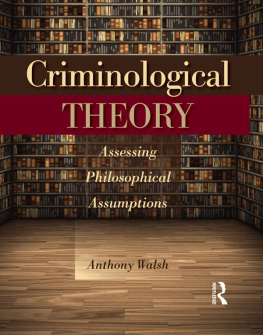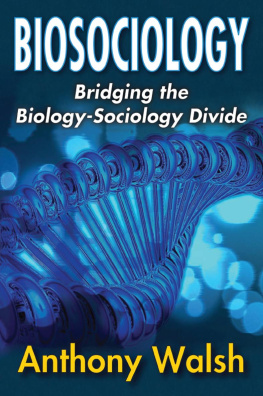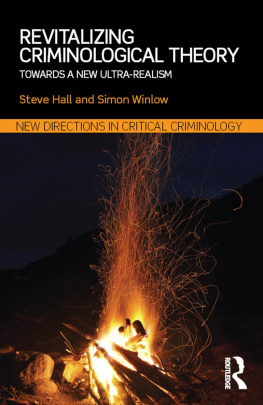
Reinforcement Sensitivity Theory
Some of the brightest minds in criminology who were nurtured on the strictly environmentalist paradigm of the 20th century have declared that biosocial criminology is the paradigm for the 21st century. This book attempts to unite this ever-growing field with the premier neurobiological theory of personality, otherwise known as reinforcement sensitivity theory (RST). Anthony Walsh places the highly variable number of biosocial approaches under a single theoretical umbrella, whilst providing a unique integrative framework.
As the leading neurobiological theory of personality and behavior in psychology today, RST focuses around the age-old question of how naturally selfish social animals can achieve their wants and needs without alienating others in their social groups. RST posits that evolution has built into humans three interacting systems: the behavioral approach system; the behavioral inhibition system; and the fight/flight/freeze system. RST identifies the neurobiological and genetic functions underlying each system and has found a cascade of supporting evidence.
Throwing new light on many areas of concern to criminologists, such as psychopathy, violence, attention-deficit/hyperactivity disorder, and schizophrenia, this book will be of interest to scholars and upper-level students in the field. Additional features such as Focus Boxes and diagrams delve into measurement techniques and brain areas.
Anthony Walsh is a professor of criminal justice at Boise State University. He received his PhD in criminology from Bowling Green State University in 1983. Walsh worked as a marine, merchant seaman, police officer, and probation officer before entering academia at the age of 44. He teaches criminology, statistics, philosophy of law, and correctional assessment and case management, and is widely published, with more than 40 books and 150 articles on a variety of topics, including criminology and biosocial aspects of crime.
Routledge Advances in Criminology
European Developments in Corporate Criminal Liability
Edited by James Gobert and Ana-Maria Pascal
The Myth of Moral Panics
Sex, Snuff, and Satan
Bill Thompson and Andy Williams
Drugs and Popular Culture in the Age of New Media
Paul Manning
Criminal Justice in International Society
Edited by Willem de Lint, Marinella Marmo, and Nerida Chazal
American Smuggling as White Collar Crime
Lawrence Karson
Young Men and Domestic Abuse
David Gadd, Claire L. Fox, Mary-Louise Corr, Steph Alger and Ian Butler
Frank Tannenbaum: The Making of a Convict Criminologist
Matthew G. Yeager
Reinforcement Sensitivity Theory
A Metatheory for Biosocial Criminology
Anthony Walsh
Mafia Violence
Political, Symbolic, and Economic Forms of Violence in Camorra Clans
Edited by Monica Massari and Vittorio Martone
For more information about this series, please visit: www.routledge.com/Routledge-Advances-in-Criminology/book-series/RAC
Reinforcement Sensitivity Theory
A Metatheory for Biosocial Criminology
Anthony Walsh
First published 2019
by Routledge
52 Vanderbilt Avenue, New York, NY 10017
and by Routledge
2 Park Square, Milton Park, Abingdon, Oxon, OX14 4RN
Routledge is an imprint of the Taylor & Francis Group, an informa business
2019 Taylor & Francis
The right of Anthony Walsh to be identified as author of this work has been asserted by him in accordance with sections 77 and 78 of the Copyright, Designs and Patents Act 1988.
All rights reserved. No part of this book may be reprinted or reproduced or utilized in any form or by any electronic, mechanical, or other means, now known or hereafter invented, including photocopying and recording, or in any information storage or retrieval system, without permission in writing from the publishers.
Trademark notice: Product or corporate names may be trademarks or registered trademarks, and are used only for identification and explanation without intent to infringe.
Library of Congress Cataloging-in-Publication Data
Names: Walsh, Anthony, 1941 author.
Title: Reinforcement sensitivity theory: a metatheory for biosocial criminology/Anthony Walsh.
Description: 1 Edition. | New York : Routledge, 2019. | Includes bibliographical references and index.
Identifiers: LCCN 2018029771 | ISBN 9781138331594 (hardback) | ISBN 9780429428234 (e-book)
Subjects: LCSH: Criminology. | Criminal behaviorPsychological aspects. | Criminal behaviorGenetic aspects. | Reinforcement (Psychology)
Classification: LCC HV6025 .W3656 2019 | DDC 658.3dc23
LC record available at https://lccn.loc.gov/2018029771
ISBN: 978-1-138-33159-4 (hbk)
ISBN: 978-0-429-42823-4 (ebk)
Typeset in Bembo
by Apex CoVantage, LLC
Contents
I first want to acknowledge senior editor Ellen Boyne for her faith in this work from the beginning. Thanks also to the three reviewers, Joseph L. Nedelec, Kevin Beaver, and Alexander Vazsonyi, for their helpful criticisms and suggestions. Ones work is always improved tremendously under the watchful eye of an editorial coordinator and a project manager who can be trusted to catch every mistake, both major and trivial. Thus, I thank Amy Freitag and Deborah Kopka for their excellent handling of this book. Thanks also to my faithful indexer, Hailey Johnson, who has expertly indexed six of my previous books. My special thanks to my drop-dead gorgeous wife Grace (AKA, the face) for her love and support over the years. She is truly a treasure; and what a very lucky man to be teamed up with her. Cheers, Facie; love ya!
As long ago as 1977, former president of the American Society of Criminology (ASA), C. Ray Jeffery, wrote an editorial in ASAs flagship journal, Criminology titled Criminologywhither or wither? He was asking whether criminology will dry up and blow away or if it will integrate with the more mature sciences, particularly with biology. He argued that criminology should have dropped many of its theories long ago because they have not produced any agreed-upon consensus about the ultimate origins of the phenomena they are supposed to explain. For a President of the ASC to argue that his discipline should drop its major theories is peculiar, but it speaks volumes about the state of the discipline. The discipline is still pretty much trapped in a static and unidimensional worldview of humans and their behavior. Jeffery had a long history of campaigning for a more biologically informed criminology, arguing that criminology must meet the biological challenge or sink into the mire (1977:285). I argue with Jeffery that scientific progress is only possible when immature sciences such as ours are vertically integrated with the more fundamental sciences. Vertical integration has been observed across all mature scientific disciplines, although many practitioners in the early history of those disciplines stoutly resisted such integration.
Most criminologists would agree in the abstract that criminology is inherently interdisciplinary, but in practice, they tend to ignore any perspective other than the one they were trained in and in which they have become comfortable. Criminologists with different disciplinary orientations conduct their research and formulate their theories apparently oblivious to what is going on in other camps. Biological factors do not operate in an environmental vacuum, nor do environmental factors operate in a biological vacuum, and we must cease formulating our theories as if they do. Humans are biological, psychological, and social beings, so all aspects must be understood to understand behavior, including criminal behavior. We in the biosocial criminology camp utilize biologically informed theories, but they tend to be ad hoc, and not tied to a common unifying theory.






